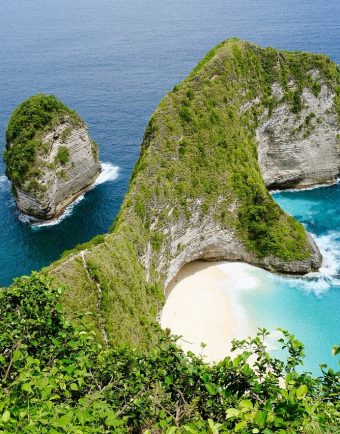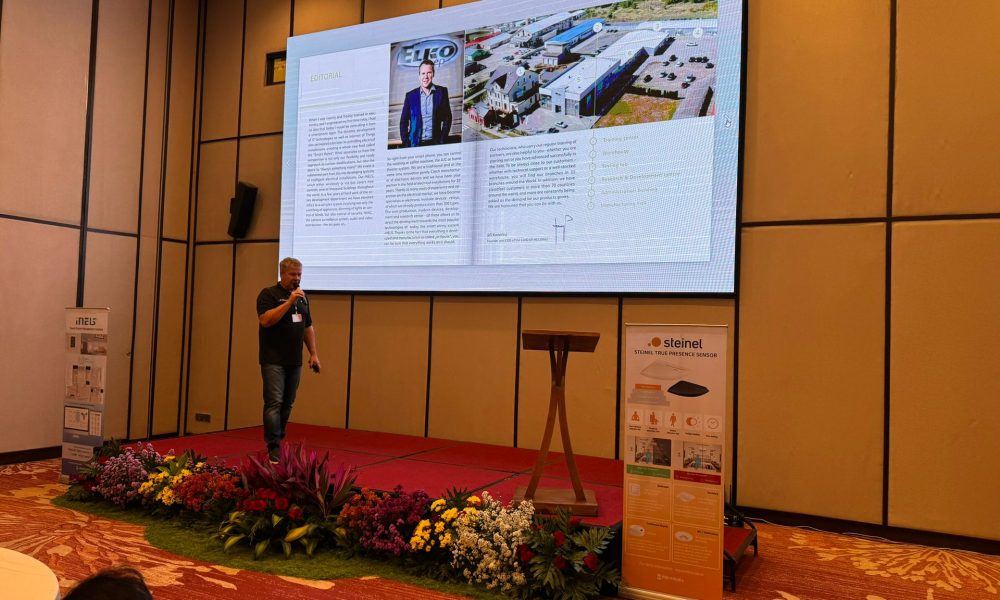

Přejít k obsahu | Přejít k hlavnímu menu | Přejít k vyhledávání

This year is all change in ELKO EP. It all started with a new brand in the portfolio – Inspinia, on which the Holešov company cooperates with the top Turkish manufacturers Astrum, who have previously supplied their software to more than 50 countries around the world.
The combination of cutting-edge software, hardware and cloud can mean revolutionary things. Then in April, ELKO EP took the plunge into the world’s biggest market – India – together with distributor Cavitak. At the end of August, it looks like another franchise office will soon be opening in Singapore. This is a good reason to invite Jiří Konečný, the owner and founder of the successful Holešov company, for a chat.Especially since he has recently returned from the famous Bali, where he went not only for the beaches, but especially for business.
How does it happen that you get invited to a conference on savings in the hotel industry in Bali?
Actually, by chance. By being active for a long time in the Middle East and the Emirates, where the whole business world meets, we have a number of interesting contacts. And it was through our big partner that we made it all the way to the Bali conference via Singapore.
How was it?
It was great because it was on a Saturday. I was surprised because Czech conferences are always held on Thursday at the latest to mark the weekend. Accordingly, they are often already devoid of energy and guests usually try to escape before the end of the conference. In Bali, the locals go to work from Monday to Friday – and if they want to educate themselves, they have weekends to do it. Still, we had a full house, and instead of the forty people who had signed up, over fifty eventually showed up. Not only did they stay for the program, but they stayed for a long time afterwards to discuss it with us. I wonder if we in Central Europe are missing this attitude and willingness a bit, if we have become too comfortable. Perhaps not.
What was the main topic of the conference?
Energy savings in hotels and their long-term sustainability in general. Two disciplines to which we as ELKO EP and iNELS really have something to say. We have been doing this for a long time and therefore we could present real data from hundreds and hundreds of implementations. And the Balinese, or Indonesians in general, also hear about the energy price, because energy prices here have also been rising not long ago.
How can your solutions be attractive for the Indonesian market?
Generally, we thrive in countries where air conditioning is more important than heating. Let me give you an example that I think we all experience. At home, my wife and I fight over whether the home will be heated to 21 or 22 degrees. But whether I win with the cooler option or my wife wins with the warmer one, the result will not be any radical savings; we would have to go to 18 degrees and start cutting back on comfort. Logically, we’re not going to do that. But it’s different with air conditioning. If you walk into a hotel room heated to thirty degrees with the sun beating down through the window, the first thing you do is task the air conditioner to immediately start cooling the room to as low as possible. 18 degrees, if its system allows it. And there’s huge sums of money flying down the chimney. In our experience, 30, sometimes 45 percent.
What does your solution do at a time like this?
First of all, it behaves predictively. It doesn’t allow anyone to go to extremes, and it takes care of it in a variety of ways. By addressing air conditioning, heating and blinds at the same time, it doesn’t allow any room in a hotel or residence to overheat. If a new guest is due to arrive in their room at 3pm, it should be a comfortable 22 degrees, with the blinds drawn and the air conditioning on standby at most. Then the guest doesn’t have to experiment and waste resources.
How did they react to this in Bali?
These are such inconsistent things that they more or less just nodded. But we want to go one step further and offer them the whole hotel management. Our strength is that we can innovate rooms without complicated drilling. Replace six pointless switches next to the bed into one compact solution, keep an eye on room security, give messages to the front desk and automate everything. So not only savings, but also design and comfort for the guest and the owner.
Will your Balinese mission continue?
Yes. Of course, I took the opportunity to take my wife on this semi-working trip to enjoy a piece of exotic vacation. But at the same time, we have already agreed on the spot with our Singaporean partner to open an ELKO EP franchise in Singapore. This would mainly serve islands such as the Philippines, Malaysia and Singapore in addition to Indonesia. Together, we are convinced that there is huge potential here. And, of course, friendly and hard-working people, which I see as a good input for further cooperation.